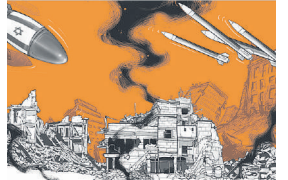

The escalating Israel-Iran conflict portends higher fuel and commodity prices following the Houthis' declaration they are joining the war.
Yemen's Houthis' announcement on Sunday followed US strikes on Iran on Saturday, threatening an escalation of the war into a wider regional conflict.
The Houthis threatened to attack Red Sea shipping following the strike on three nuclear sites in Iran. In a statement on Sunday, the Houthi political bureau also called on Muslim nations to join "the Jihad and resistance option as one front against the Zionist-American arrogance."
The war has already caused a three per cent increase in oil prices, with fears of further additions as chances for diplomacy diminish.
Iran is the third-largest producer among members of the Organisation of the Petroleum Exporting Countries, producing about 3.3 million barrels per day of crude oil.
Additionally, about 18 million to 21 million bpd of oil and oil products move through the Strait of Hormuz along Iran's southern coast, which might be disrupted by the fighting. The strait is the main transit point for Middle Eastern oil.
RBC Capital analyst Helima Croft told Reuters that the risk of major energy disruption will rise if Iran feels existentially threatened, and U.S. entry into the conflict could trigger direct attacks on tankers and energy infrastructure.
Iran is also a key destination for Kenyan tea, with exports valued at Sh5.98 billion in 2023. The fighting comes at a time Kenya was engaged in talks to lift a ban on Kenyan tea.
The ban was triggered by a Sh168 billion scandal involving the export of substandard tea.
In February this year, Kenya and Iran signed a trade deal to export 50 metric tonnes of beef in a bid to strengthen bilateral ties.
Kenya also imported goods worth $28.5 million in 2023. The war risks disrupting this trade due to weakened supply chains and Iran’s exclusion from international payment systems.
The rising oil prices increase production and transport costs for agricultural commodities such as maize and wheat, which Kenya partially imports.
The supply chain disruptions, including logistical challenges in shipping, have reduced export volumes to Iran.














